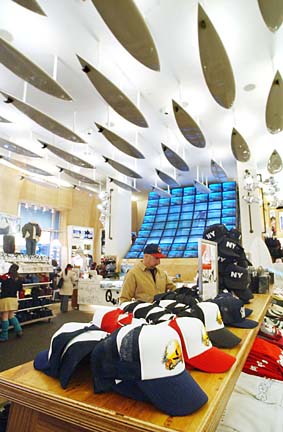
ASSOCIATED PRESS
Surfboards hung from the ceiling of New York's Times Square Quiksilver store last month. While traditional clothing lines and retailers are seeing only modest sales gains, specialty-wear companies such as Pacific Sunwear of California Inc. and Quiksilver Inc. are riding a wave of hot sales by targeting youths lured by the look of skateboarders and surfers.
Surfing, boarding
a culture of cashTwo companies expect
revenue will beat $1 billion
LOS ANGELES >> The surfer and the skateboarder have become the salvation of two Southern California companies whose target customers are teenagers and young adults.
Pacific Sunwear of California Inc. and Quiksilver Inc. each expect to surpass $1 billion in revenue this year by selling the boardsport mystique around the world.
"It's like buying an identity," Maria Andersen, 24, of Denmark said on a recent visit to the Quiksilver store at The Grove, an upscale shopping district in Los Angeles.
"I like the style -- the whole surfing, snowboarding culture," said Andersen, a snowboarder who is also learning to surf.
The firms are thriving by catering to the narrow and ever-changing tastes of the 12-to-24 age group while larger, more traditional companies such as once-hot American Eagle Outfitters Inc. and Abercrombie & Fitch are struggling.
The surf and skateboarding culture has exploded in recent years thanks to television shows such as MTV's "Surf Girls" and "Boarding House: North Shore" on the WB network, and movies such as 2002's "Blue Crush." Boardsports have also been a staple for years on ESPN's popular "X-Games" competitions.
"Alternative sports, which includes skateboarding, surfing, snowboarding, motocross, etc., continue to grow in popularity as they receive more widespread TV coverage," Irma Zandl, president of the Zandl Group, a New York trend research firm, said. "So there is a solid foundation for fashion influenced by these sports -- it's not faddish."
"There are a lot of kids out there who have no exposure to surfing in particular and they may rarely go to the beach, if ever, but they feel connected to it because it's on TV and it's on the Internet," said Mitch Kummetz, an analyst with D.A. Davidson & Co., a Denver-based financial services firm.
